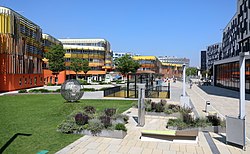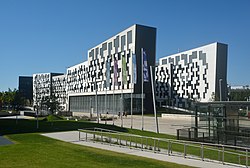Wirtschaftsuniversität Wien
History

WU was founded on 1 October 1898 as k.u.k. Exportakademie (in English: Export Academy) to provide professional training to future businessmen and thus stimulate the Austro-Hungarian empire's economy. From humble beginnings as a professional school, it quickly grew to become an important institution, which was awarded the status of a fully-fledged Hochschule (an educational institution equivalent to a university, but specializing in a certain field such as technology or business or art) in 1919. At that time, it was renamed to Hochschule für Welthandel. The course of studies leading to the academic degree of Diplomkaufmann provided training preparing for the export and banking businesses and was very practical, comprising courses in business administration, economics, law and others. In 1930, the Hochschule für Welthandel was granted the right to issue doctoral degrees.
After World War II, the Hochschule für Welthandel increased its breadth in research. It started to become a very important institution in Austrian society at that time; most Austrian managers and many politicians received their university education here. From 1966 onward, it began to offer a more theoretical course of studies in economics. In 1975, it was renamed to Wirtschaftsuniversität Wien. At the same time, the number of students began to increase dramatically. In 1983, it moved to a campus in Vienna's 9th District. Due to further increasing student numbers during the 1990s the campus became too small. As a result, new university grounds had to be built in Vienna's 2nd district. The new Campus WU opened in October 2013, next to the Vienna Fair Ground.
In January 2015, Edeltraud Hanappi-Egger was elected rector of WU. She is the first woman in the history of the University to be elected rector. Her term began on 1 October 2015. Inaugurated in 2023, the current rector of the university is Rupert Sausgruber.
New campus






The new location is dubbed "Campus WU" and had its groundbreaking ceremony in October 2009. Close to the Prater public park, and next to the exhibition centre of Vienna, the campus features 6 main building complexes resting on approximately 25 acres (10 ha). The master plan was created by BUSarchitektur under the guidance of the architect Laura P. Spinadel. The buildings of the campus are designed by architectural firms from Spain, the United Kingdom, Germany, Japan and Austria. The dominant element of the campus is the Library & Learning Center, which was planned by Zaha Hadid.
Construction began in June 2010 and paved the way for the largest campus for business sciences in Europe. With a total investment of 492 million Euros and a planned construction period of 3 years, the project was concluded in 2013. Campus WU is situated close to the public transport hub Praterstern and is serviced by two stations of the underground line U2 and a number of buses.
The LLC has five cores, each with a different complex geometry. The core walls are inclined at different angles and so are the corners which are also rounded with different radii. MEVA has developed and uses both standard and special formwork, or a combination of both, to meet the forming requirements for these complex building parts. Steel formwork, for example, is used for rounded corners if required for structural reasons. Trapezoidal areas of inclined cylindrical corner areas are poured with special Mammut 350 wall formwork panels and special designs of MEVA’s circular column formwork Circo are used for the tilted and rounded corners.
The WU moved to the new site in September 2013, which is located at Welthandelsplatz 1, 1020 Vienna, Austria.
Rankings and Accreditations
In 2009 Vienna University of Economics and Business was ranked as one of the best business schools in the German-speaking countries according to Handelsblatt, and in 2011 it was ranked 21st in the list of the 392 worldwide leading higher education institutions by the Mines ParisTech: Professional Ranking of World Universities. The study obtained the higher education career of the CEOs of the world's leading 500 companies.
WU was ranked 42nd in the "European Business School Ranking 2014" by Financial Times. The Global Executive MBA Program by WU Executive Academy was ranked 44th in the "Executive MBA Ranking 2015" by Financial Times.
The university's master in international management program was ranked 8th in the "Masters in Management Ranking 2016" by Financial Times.
The university is part of the respected consortium of Europe's leading schools and corporate partners – Community of European Management Schools (CEMS).
WU has achieved accreditation from the London-based Association of MBAs (AMBA), Brussels-based EQUIS and Tampa-based Association to Advance Collegiate Schools of Business (AACSB International). Only 72 business universities worldwide can claim triple crown accreditation by EQUIS, AACSB, and AMBA.
In September 2020 the Master Program Strategy, Innovation and Management Control achieved the 10th place in the QS Masters in Management Ranking making it the highest ranked Management Master program in the German speaking region.
Notable faculty
- Gustaf Neumann
- Christoph Badelt
- Christoph Grabenwarter
- Edeltraud Hanappi-Egger
- Manfred M. Fischer
- Renate Meyer
- Ewald Nowotny
- Bodo Schlegelmilch
- Clive Spash
- Wolfgang Lutz
- Gabriel Felbermayr
Notable alumni
Politicians
- Thomas Klestil (1932–2004), Austrian President (1992–2004)
- Franz Vranitzky (1937– ), Austrian Chancellor (1986–1997)
- Ferdinand Lacina (1942– ), Austrian Finance Minister (1986–1995)
- Hannes Androsch (1938– ), Austrian Finance Minister (1970–1981) and Vice-Chancellor (1976–1981)
- Christoph Chorherr (1960– ), Green Party Spokesperson (1996–1997)
- Madeleine Petrovic (1956– ), Green Party Spokesperson (1994–1996)
- Wolf Klinz, Liberal Party member of the European Parliament (2004–present)
- Petra Steger, Freedom Party of Austria member of the National Council
- Christoph Meineke (1979– ), Mayor
- Andreas Salcher (1960– )
- Sixtus Lanner (1934–2022), Austrian MP
- Ilona Graenitz (1943–2022), Austrian MP and MEP
Entrepreneurs and managers
- Max Auschnitt (1888–1957), Chairman of Iron Domains and Factory and Titan-Nădrag-Călan
- Peter Brabeck-Letmathe (1944– ), Chairman and CEO Nestlé AG
- Oskar Deutsch (born 1963), entrepreneur and President of the Jewish Community of Vienna
- Hikmet Ersek (1954– ), CEO Western Union
- Hans-Peter Haselsteiner (1944– ), CEO Strabag SE
- Peter Löscher (1957– ), CEO Siemens AG (2007–2013)
- Dietrich Mateschitz (1944–2022), Founder & CEO Red Bull
- Wolfgang Porsche (1943– ), Chairman of Porsche AG, Porsche SE and Volkswagen AG supervisory boards
- Claus Raidl (1942– ), former CEO Böhler-Uddeholm, President Oesterreichische Nationalbank
- Erman Ilıcak, President of Rönesans Holding, ranked 1st in Forbes Turkey’s “100 Wealthiest Turks” list in 2019.
- Stefan Fak, Austrian-born businessperson
- Stefan Günther Tweraser, Austrian-born businessman
Diplomats
- Zygmunt Vetulani (1894–1941), Consul General of the Republic of Poland in Baghdad and Rio de Janeiro
Historians
- Juan Friede (1901–1990), Muisca scholar and historian of Colombia
Public Institutions
- Maria Schaumayer (1931–2013), President Oesterreichische Nationalbank (1990–1995)
Notes
- ^ "Edeltraud Hanappi-Egger elected as WU's new Rector". Vienna University of Economics and Business. Retrieved 18 September 2017.
- ^ "Rektorat" (in German). Retrieved 2024-09-02.
- ^ "The New Vienna University of Economics and Business".
- ^ "Business school rankings from the Financial Times - FT.com". rankings.ft.com.
- ^ "Masters in Management 2016". Financial Times. Retrieved 15 September 2017.
- ^ "WU receives AACSB accreditation and completes triple crown accreditation | WU". Archived from the original on 19 September 2015. Retrieved 20 September 2015.
- ^ "Masters in Management 2021". QS. Retrieved 25 September 2020.
- ^ "Curriculum Vitae Claus Raidl". Retrieved 16 June 2017.
- ^ (in Spanish) Historiadores internacionales influyentes en Colombia – Banco de la República
- ^ "Schaumayer, Maria in Austria-Forum.org" (in German). Retrieved 27 September 2016.